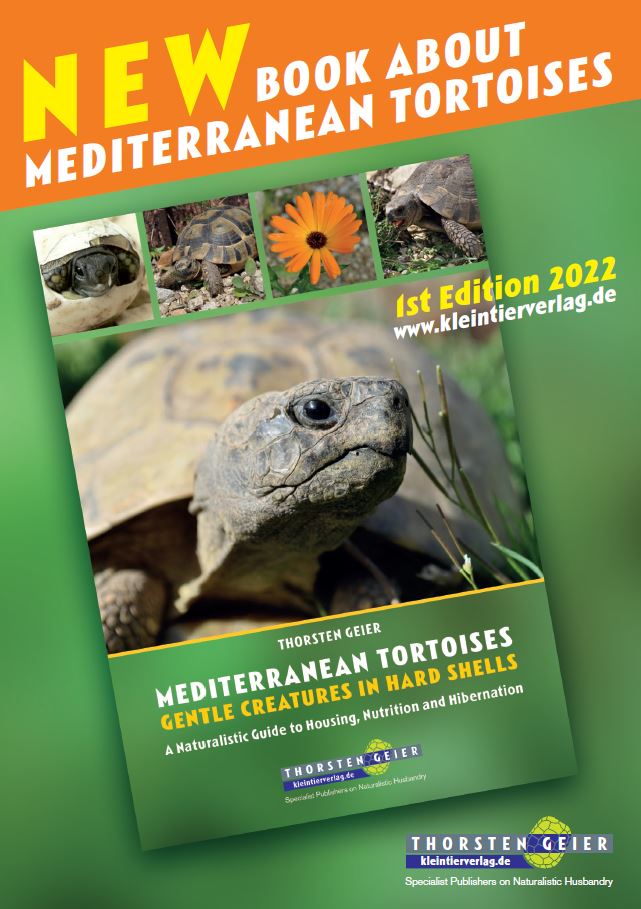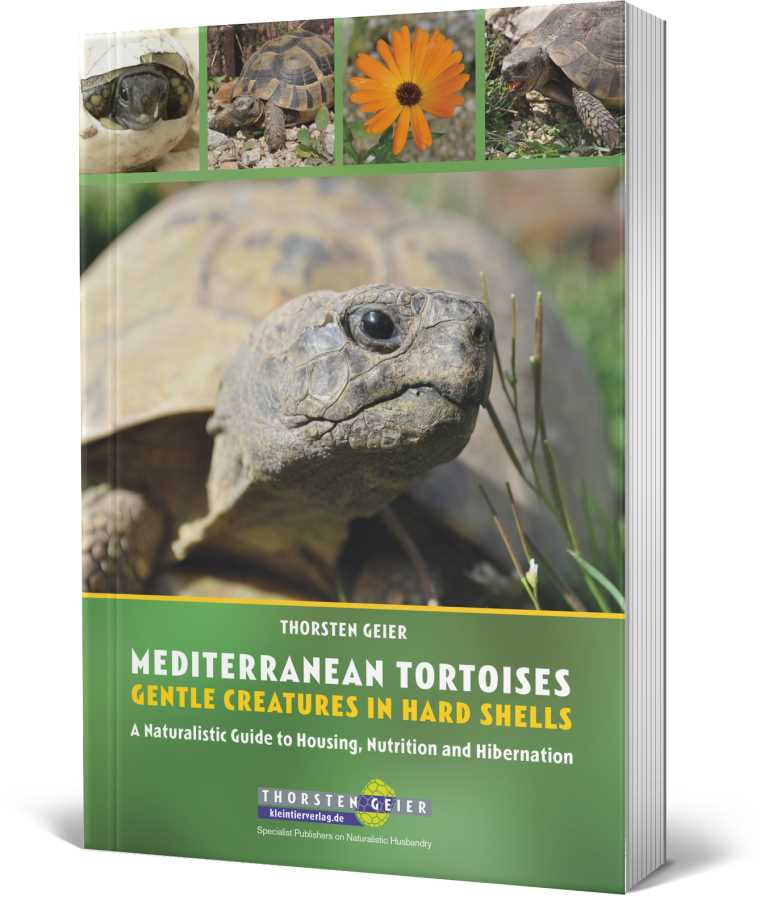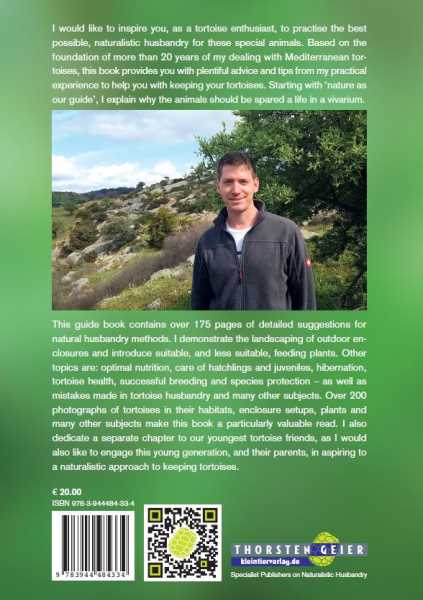Mediterranean Tortoises
Gentle Creatures in Hard Shells

Keeping Mediterranean Tortoises
Dear tortoise friend,
I am delighted that you are interested in Mediterranean tortoises and are looking through this website. I will give information about these fantastic tortoises at beginners level in tortoise-keeping, including children. But the experienced keeper will probably also benefit from valuable and practical suggestions. This information about Mediterranean Tortoises is for keeping Hermann’s tortoises, Spur-thighed tortoises (Greek tortoises or Moorish tortoises), Horsfield’s tortoises (Russian tortoises, Central Asian tortoises, Steppe tortoises, Afghan tortoises or Four-toed tortoises) and Marginated tortoises.
I caught the ‘tortoise bug’ in 1999, and was immediately enthusiastic about getting to know these fascinating animals. My initial husbandry of tortoises was good, although less than perfect – but nowadays, my animals live in large outdoor enclosures with many rocks, hills and plants.
The focus of my husbandry is the keeping of tortoises in a naturalistic way. It is very important to me that these animals, which are not indigenous to our climatic regions, are able to enjoy a life that meets the needs of their species as much as possible. So, I asked myself how a captive environment can be created which closely resembles Mediterranean tortoises’ natural habitats. I will try to answer this question – also with some details and explanatory photographs. I will emphasise husbandry in outdoor enclosures, as well as introduce suitable foraging plants. Serious mistakes can be made by incorrect husbandry methods and providing the wrong nutrition. In order to help avoid these mistakes right from the start, I can promise you many photographs showing my own tortoise enclosures and those of other expert keepers.
I will also introduce you to many suitable foraging plants with close up images for easy identification, which will hopefully help you provide an optimal diet for your animals.
I am living in Germany, so my guide is based on my experiences with tortoise-keeping in Hessen, Germany. It is important to note that regional temperatures may impact on periods of tortoise activity, and that therefore my husbandry recommendations may have to be modified. This is particularly relevant for other European countries, for which I have published this English-language book. Giving one example: my animals wake up from hibernation in March – whereas tortoises kept in Switzerland would be surprised to wake up to high snow levels at that time!
Over recent years I have published several German-language tortoise guide books which deal with special topics such as hibernation, nutrition and enclosure building. Now I have brought out a special English book for all international tortoise friends.
I would be very happy if you would like to read it. It is a guide book, in which I will introduce you to the husbandry – guided by nature – of my tortoises, which have been part of my life for over 20 years. There are many ways to keep tortoises, but I am sure that this book can make an important contribution to the best husbandry methods for them. This way, your tortoises can live a close-to-natural life, and you can enjoy their lives with them. I would also like to encourage you to share my advice with other tortoise owners, in order to enable a tortoise, which may, for example, be suffering a miserable existence in a rabbit cage, to live a better life.
Even experienced keepers repeatedly come up against problems with hibernation. This book addresses these with detailed and important information. One example; an animal kept in best conditions throughout the summer will have the best chances to go through its hibernation without complications.
Have fun keeping tortoises and enjoy watching them in their outdoor enclosures!
Yours,
Thorsten Geier

Simply order my new book about Mediterranean tortoises on amazon
Thorsten Geier
Publisher: Kleintierverlag Thorsten Geier (Germany), Specialist Publishers on Naturalistic Husbandry

EDIBLE PLANTS
Edible plants for a natural diet
OUTDOOR ENCLOSURES
NATURE
Natural habitat of Mediterranean Tortoises
HIBERNATION
Hibernation

Mediterranean Tortoises: Gentle Creatures in Hard Shells
A Naturalistic Guide to Housing, Nutrition and Hibernation
I would like to inspire you, as a tortoise enthusiast, to practise the best possible, naturalistic husbandry for these special animals. Based on the foundation of more than 20 years of my dealing with Mediterranean tortoises, this book provides you with plentiful advice and tips from my practical experience to help you with keeping your tortoises.
Starting with ‘nature as our guide’, I explain why the animals should be spared a life in a vivarium. This guide book contains over 175 pages of detailed suggestions for natural husbandry methods. I demonstrate the landscaping of outdoor enclosures and introduce suitable, and less suitable, feeding plants.
Other topics are: optimal nutrition, care of hatchlings and juveniles, hibernation, tortoise health, successful breeding and species protection – as well as mistakes made in tortoise husbandry and many other subjects. Over 200 photographs of tortoises in their habitats, enclosure setups, plants and many other subjects make this book a particularly valuable read.
I also dedicate a separate chapter to our youngest tortoise friends, as I would also like to engage this young generation, and their parents, in aspiring to a naturalistic approach to keeping tortoises.
My book should be regarded as a basic guide for keeping Hermann’s tortoises, Spur-thighed tortoises (Greek tortoises or Moorish tortoises), Horsfield’s tortoises (Russian tortoises, Central Asian tortoises, Steppe tortoises, Afghan tortoises or Four-toed tortoises) and Marginated tortoises.

